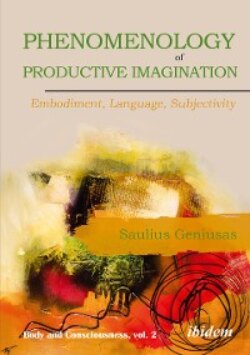Читать книгу Phenomenology of Productive Imagination: Embodiment, Language, Subjectivity - Saulius Geniusas - Страница 11
На сайте Литреса книга снята с продажи.
CHAPTER II
What is Productive about Reproductive Imagination? Edmund Husserl’s Phenomenology of Phantasy and the Constitution of Cultural Worlds Introduction
ОглавлениеIn this chapter, my goal is to open up a conceptual space for the analysis of productive phantasy in the general framework of Husserlian phenomenology. Such an undertaking calls for an exploratory investigation, which is primarily concerned with various hints, clues or intimations that we come across in Husserl’s phenomenology. Building on these resources, I wish to explore the constitutive role of phantasy within the overall framework of constitutive phenomenology. In Chapter I, I already provided a preliminary clarification of the concept of productive phantasy. I suggested that this concept is to be understood as a basic modality of intentionality that indirectly shapes the human experience of the actual world by forming the contours of action, intuition, knowledge and understanding. Admittedly, Husserl never spoke of imagination in general, or of phantasy in particular, in such terms.1 Rather, he consistently qualified both phantasy and image consciousness, conceived as the two fundamental forms of imagination, as essentially reproductive modes of intuitive consciousness, that is, as a kind of consciousness that intends modified actualities, actualities as if. Nonetheless, in his writings we come across various clues, the elaboration and development of which can help us to recognize the constitutive function of phantasy within the overall framework of transcendental phenomenology.
It is not my goal in this chapter to offer a systematic account of Husserl’s phenomenology of the imagination. Such an undertaking would be quite gratuitous in a study focused on productive imagination, if only because Husserl never described his phenomenology of phantasy as a phenomenology of productive imagination. Not only that: the rejection of Kant’s psychology of faculties lies at the heart of Husserl’s phenomenology of imagination, which, in turn, underlies Husserl’s early conviction that Kant’s concept of Einbildungskraft is outdated and hopelessly confused;2 furthermore, it suggests that Husserl’s phenomenology unfolds within a different conceptual framework from the one that is usually employed while discussing productive imagination.3 This circumstance alone explains the common claim voiced in the literature on productive imagination, which is that classical phenomenology in general, and Husserlian phenomenology in particular, have nothing to contribute to our understanding of productive imagination (see, for instance, Ricœur 1975, Sallis 1992, and, more recently, De Santis 2019 and Doyon 2019). It should, therefore, not surprise us that very few critical studies of Husserl’s phenomenology of imagination have provided an inquiry into productive imagination, even though, more generally, the critical literature on Husserl’s phenomenology of imagination is voluminous and has recently experienced a kind of efflorescence.4 Thus, all appearances suggest that, to borrow James Morley’s vivid metaphors, classical phenomenology pushes productive imagination into “the outer darkness of intellectual irrelevance” in that it treats productive imagination as a “Mischling”—a “bastard child,” who has no place within the “image family” (see Morley 1998).
Still, a study on the phenomenology of productive imagination would remain incomplete and deficient if it overlooked the importance of various clues that we come across in Husserl’s writings. The goal of this chapter is to focus on some of these clues and to develop them in a direction that Husserl himself did not explore and which he would, quite likely, not even wish to pursue. My goal is to show that Husserl’s phenomenology can make a significant contribution to the philosophy of productive imagination, yet for quite a paradoxical reason: precisely because of its “obsession” with reproductive imagination, Husserlian phenomenology enables us to determine the concept of productive imagination with great precision. It is not so uncommon to suggest that only a paradigm shift in philosophy of imagination can lead to the recognition of the productive capacities of imagination.5 Yet such a paradigm shift, conceived either as an ontological or as a hermeneutical turn in the phenomenology of imagination, constitutes only certain ways—and certainly not the only ways—to speak meaningfully about productive imagination. My goal here is to show that in no other philosophical framework than that of Husserlian phenomenology can one better develop an approach that takes its departure from the insight that productive imagination is a relative term, whose meaning derives from its opposition to reproductive imagination. To come to terms with what productive imagination is, we should first and foremost fix the meaning of reproductive imagination, and in this regard, it is exceptionally fruitful to turn to Husserlian phenomenology.
In what follows, I will take four steps. First, I will address the concept of reproduction in Husserl’s phenomenology and fix the sense in which Husserl invites us to conceive of phantasy as an essentially reproductive consciousness. Second, I will address the relation between perception and phantasy and argue that once phantasy is determined as a reproductive mode of consciousness, it cannot be conceived as an ingredient of perception. In the third part, I will focus on the relation between memory and phantasy and will maintain that not only memory, but also phantasy can generate patterns of meaning, which can subsequently be transcribed into the field of positional experience. In the fourth part, I will further show how this outlined approach opens the possibility of interpreting the plurality of cultural worlds as diverse configurations of meaning, whose constitution entails the accomplishments of productive phantasy.
